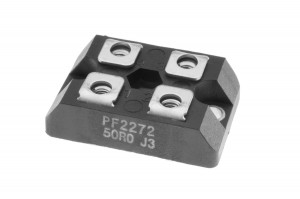Riedon’s PF2272 and PF2274 now feature resistance values up to 1Mohm
Advanced manufacturing techniques have allowed Riedon to extend the resistance values available for our two hundred watt (PF2272) and three hundred watt (PF2274) TO-227 packages from 100KΩ to 1MΩ.
By offering an exceptionally low inductance of 13.7nH and capacitance of 13.1pF the PF2270 series is suitable for a wide range of frequencies and applications. The PF2270 series also includes a standard insulation voltage of 2.5kV with higher values available on request as well as a completely resin filled chamber to enhance insulation voltage and provide for the ultimate in durability and enhanced stability. While these features are already class leading, the extended resistance range increases the versatility of this compact package even further.
Good thermal management is a must!
Thermal management is extremely important when working with such compact, yet highly powerful, resistors such as those in the PF2270 series. Careful calculations using the following formula should be performed to determine a correctly sized heat sink or chiller plate:
RθH = (TMAX – (P * RθR) – TA)/ P
Where:
RθH = Thermal Resistance of Heatsink ( °K/W )
RθR = Thermal Resistance of Resistor ( °K/W )
TMAX = Maximum Temperature of Resistor ( °C )
TA = Ambient Temperature of Heatsink ( °C )
P = Power Through Resistor ( W )
As an example, let’s calculate the required thermal resistance for a heat sink and thermal interface material for an application requiring 150 watts in a normal operating environment of 30°C. The remaining two variables can be obtained directly from the datasheet and results in a RθR of 0.35 °K/W and a TMAX = 155°C.
RθH = (155 – (150*0.35) – 30)/150
This calculation results in a heat sink and thermal interface (grease, pad, etc.) with a thermal resistance equal to or less than 0.48 °K/W to safely operate the resistor at this power level.

